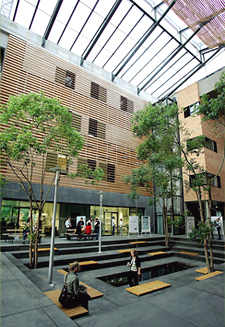IGF/IGFR
IGF/IGFR expression and methylation as mechanism of metabolic programming in preimplantation embryos
Zeitraum
- Januar 2008 bis Dezember 2010
Leitung
- Dr. Anne Navarrete Santos
Mitarbeiter
- Prof. Dr. Dr. Bernd Fischer
Partner
- Prof. Anna M. Wobus, head of the “In vitro differentiation group”, Leibniz Institute for Plant Genetics and Crop Plant Research (IPK), Gatersleben
Förderung
- DFG NA 418/4-2
- Fördersumme: 118.748 € zzgl. 36 Monate 1 BAT II(O)
Zusammenfassung
Most important for embryo growth and development are adequate endocrine and paracrine regulation and access to metabolic substrates. The few days of preimplantation embryo development are extremely sensitive to hormonal dysregulation and changes in the supply of nutrients. The embryo has an astonishing capacity to adapt shortly to metabolic changes. A molecular “cell memory” can store this “stress” information, leading to changes in the metabolic programming of further embryo development and differentiation. The mechanisms of metabolic programming are unclear. It is very likely that the IGF/IGFR system is involved, most probably by epigenetic modifications such as de novo methylation in the promoter regions of the IGF/IGFR genes (epigenetic imprinting). In the proposed project we will employ two models, i) preimplantation embryos in utero, and ii) embryonic stem cells in vitro, to prove this hypothesis. Changes in transcription and promoter methylation will be analysed by quantitative RT-PCR and combined bisulfite restriction analysis (COBRA).
- In the in vivo model, preimplantation rabbit embryos will grow in diabetic and non-diabetic mothers. In the uterine fluid and blastocyst cavity, i.e. the most relevant adjacent micro-environments for preimplantation embryos, glucose, insulin, IGF1 and IGF2 will be determined and correlated with the expression and methylation status of embryonic IGF genes.
- In the embryonic stem cell model metabolic stress will be induced by culture in media with high/ low glucose and insulin, mimicking a diabetic situation. Long–term metabolic programming will be studied by stem cell differentiation. The advantage of this model is to elucidate the causal impact of defined metabolic stimuli on relevant endpoints in a highly standardised experimental approach.
Publikationen
- Fischer, B., Navarrete Santos A. (2003) Glukose, Insulin und Glukosetransporter: Bedeutung und Weichenstellungen für die Embryonalentwicklung. Reproduktionsmedizin 19, 195-201
- Navarrete Santos, A., Tonack, S., Kirstein, M., Kietz, S., Fischer, B. (2004) Two insulin-responsive glucose transporter isoforms and the insulin receptor are developmentally expressed in rabbit preimplantation embryos. Reproduction 128, 503-516
- Navarrete Santos, A., Tonack, S, Kirstein, M., Pantaleon, M., Kaye, P., Fischer, B. (2004) Insulin acts via MAPK phosphorylation in rabbit blastocysts. Reproduction 128, 517-526
- Tonack, S., Rolletschek, A., Wobus, A., Fischer, B., Navarrete Santos, A. (2006) Differential expression of glucose transporter isoforms during embryonic stem cell differentiation. Differentiation 74, 499-509
- Navarrete Santos, A., Ramin, N., Sarah Tonack, S., Fischer, B. (2008) Cell lineage-specific signalling of insulin and insulin like growth factor (IGF) 1 in rabbit blastocysts. Endocrinology 149, 515-524
- Schmidt, T., Fischer, S., Tsikolia, N., Navarrete Santos, A., Rohrbach, S., Ramin, N., Thieme, R., Fischer, B. (2008) Expression and role of adipokines in preimplantation rabbit and mice embryos. Histochem Cell Biol 129, 817-25




